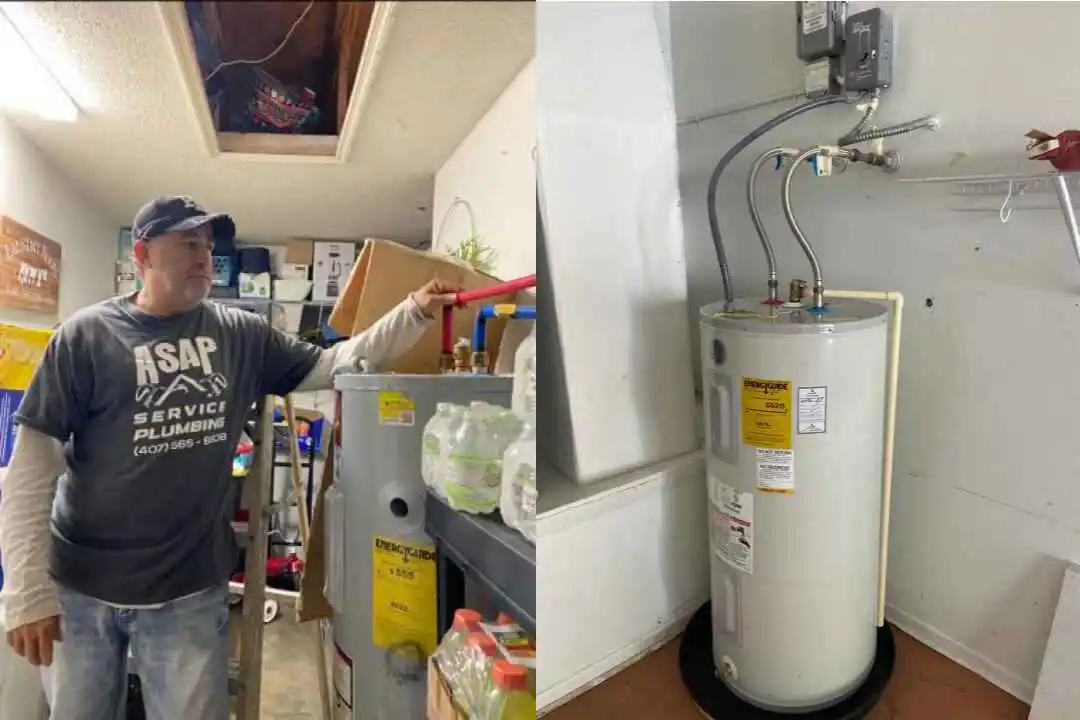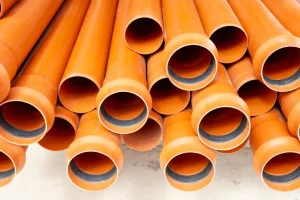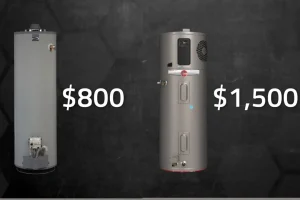When it comes time to replace your water heater, you’ll likely encounter the decision between a traditional tank water heater and a modern tankless option.
Tank water heaters store hot water in a tank, while tankless heaters heat water on demand. Both have their advantages and drawbacks, impacting factors like energy efficiency, space requirements, and upfront costs.
Let’s explore the comparison between tank and tankless water heater replacements to help you make the best choice for your home.
A Quick Comparison Between Tank Water Heater & Tankless Water Heater Replacement
Since choosing between a tank water heater and a tankless water heater replacement is a significant decision for your home, let’s check the chart below and explore their key differences, advantages, and drawbacks first.
| Factor | Tank Water Heater | Tankless Water Heater |
| Upfront Cost | Lower | Higher |
| Installation Cost | Lower (usually) | May require additional plumbing or gas line work |
| Energy Efficiency | Lower | Higher (heats water only when needed) |
| Hot Water Availability | Consistent, even during high-demand periods | On-demand, limitless supply (as long as capacity isn’t exceeded) |
| Maintenance | Requires periodic flushing to prevent sediment buildup | Less maintenance required |
| Space Requirements | Larger footprint (requires a tank for storage) | Compact design (can be wall-mounted) |
What Is a Tank Storage Water Heater?
A tank storage water heater is a traditional type of water heating system that stores hot water in a tank until it’s needed.
It consists of a large insulated tank with a heating element (either gas or electric) that maintains the water temperature. When hot water is used, cold water enters the tank to replace it, and the heating element reheats the water to maintain the set temperature. Tank storage water heaters are common in residential homes due to their simplicity, reliability, and relatively low cost.
What Is a Tankless Water Heater?
A tankless water heater operates by heating water directly as it passes through the unit, eliminating the need for a storage tank. When a hot water faucet or appliance is activated, cold water flows into the heater and is rapidly heated by a gas burner or electric heating element.
This on-demand heating process ensures hot water is available instantly, without the standby heat loss experienced by traditional tank water heaters.
Tankless water heaters are known for their compact design, which saves space compared to bulky tank heaters. They can be installed on walls or in tight spaces, making them versatile for various home layouts.
Comparing Tank vs. Tankless Water Heater Replacement
Replacing your water heater means choosing between a traditional tank water heater and a modern tankless water heater, a decision that isn’t very easy. Each option comes with its own set of benefits and considerations that can affect your household’s comfort, energy efficiency, and budget.
Let’s take a closer look to help you decide which option is the best water heater replacement in Orlando and Kissimmee for you.
1. Installation Cost
In terms of installation costs, there exists a noticeable difference between tank and tankless water heaters.
- Tank Water Heater: Installing a tank water heater is generally simpler and less expensive. The average installation cost ranges from $400 to $1,000. This covers the cost of labor, materials, and any necessary adjustments to your plumbing system.
- Tankless Water Heater: On the other hand, installing a tankless water heater is often more complex and expensive. The national average installation cost is around $2,500, but it can vary widely depending on factors such as the size of the unit, the complexity of the installation, and your location. Estimates can range from $1,000 to $6,000 or more.
2. Operating Cost
Operating costs for water heaters can vary based on several factors. Tank water heaters typically have lower upfront costs but may draw higher operating expenses due to standby heat loss.
On the other hand, tankless water heaters generally have higher initial costs but lower operating expenses because they only heat water as needed.
In a nutshell:
- Tank Water Heater: Lower initial cost, higher operating cost due to standby heat loss. The annual operating cost can range from $200 to $600.
- Tankless Water Heater: Higher initial cost, lower operating cost due to on-demand heating. The annual operating cost is typically lower, ranging from $150 to $300.
3. Space Requirement
Tank water heaters typically require more space because they’re larger and need room for the tank. You’ll need a designated area for installation, usually in a utility room or basement.
Tankless water heaters are more compact, often mounted on a wall, saving space. They’re a great option if you’re tight on space or want to free up room for other uses. So, if space is limited, a tankless water heater might be the way to go.
4. Energy Efficiency
Tankless water heaters are more energy efficient than tank water heaters because they only heat water as needed, eliminating standby energy loss.
Tank heaters keep a large amount of water hot all the time, which can waste energy, especially if you don’t use much hot water.
With tankless heaters, you only heat water when you need it, which can lead to significant energy savings over time. So, if you’re looking to reduce your energy bills, a tankless water heater might be the better choice for you.
5. Hot Water Availability
Tank water heaters typically provide a large reservoir of hot water, so you can use multiple fixtures simultaneously without running out. However, once the tank is empty, you’ll need to wait for it to refill and heat up again.
Tankless water heaters heat water on demand, providing a continuous supply as long as there’s enough capacity. While they can’t always handle multiple high-demand fixtures simultaneously, they’re great for consistent hot water flow and never running out.
6. Wait Time for Hot Water
With a tank water heater, there’s usually a wait time for hot water because you have to wait for the tank to heat up the water before it reaches your faucet or shower. Typically it ranges from 30 to 120 minutes, depending on the distance between the heater and the fixture, as well as the size of the tank.
On the other hand, tankless water heaters heat water instantly as it flows through the unit, so there’s virtually no wait time for hot water. You’ll get hot water as soon as you turn on the tap, making tankless heaters convenient for quick access to hot water.
7. Lifespan
Tank water heaters typically have a lifespan of around 10 to 15 years with proper maintenance. Over time, sediment buildup and corrosion can affect the tank’s efficiency and lead to leaks or failure.
In contrast, tankless water heaters can last much longer, often 20 years or more. Since they don’t store water and experience less wear and tear, they’re less prone to corrosion and have fewer parts that can malfunction.
So, if you’re looking for a water heater with a longer lifespan, a tankless option might be the better choice.
8. Maintenance
Tank water heaters generally require more maintenance than tankless ones. You need to regularly flush the tank to remove sediment buildup, which can affect efficiency and lifespan.
Additionally, you should inspect and replace the anode rod every few years to prevent corrosion. With tankless water heaters, maintenance is simpler. You may need to descale the unit occasionally to prevent mineral buildup. But overall, they require less frequent maintenance.
If you prefer a low-maintenance option, a tankless water heater could be the way to go.
Tank vs. Tankless Water Heater Replacement: Which One Should I Choose?
Your specific needs and preferences should be considered when deciding between a tank and tankless water heater replacement.
Choose a Tank Water Heater If:
- You prioritize an affordable upfront cost.
- You have a large household needing consistent hot water.
- You prefer a straightforward and familiar heating system.
Choose a Tankless Water Heater If:
- You seek long-term savings.
- You have limited space.
- You’re environmentally conscious and prefer lower energy consumption.
If you still cannot decide which option you should go for, seek professional help. Contact a reliable plumbing service to receive various analyses and make a well-informed decision.
Frequently Asked Questions
Can you replace a tank water heater with a tankless one?
How many kW is a tankless water heater?
What is the energy rating of a tankless water heater?
In Closing
Choosing between a tank and tankless water heater replacement is an important decision that impacts your home’s comfort and efficiency. You should consider factors such as energy efficiency, space needs, and upfront costs to make the right choice for your household.
If you’re in Florida and need assistance with your water heater replacement, consider reaching out to professional water heater replacement services in Orlando.
With their expertise and guidance, you can ensure a smooth transition to a new water heating system that meets your needs and enhances your daily comfort.




